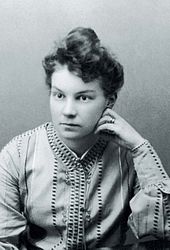L. Onerva
L. Onerva (born 28. April 1882 in Helsinki as Hilja Onerva Lehites , go Madetoja;. Died 1. March 1972 ibid ) was a Finnish writer and translator.
Onerva's father was Johan Lehtinen, an employee in a timber trading company. Mother Serafina was admitted to a mental institution when Onerva was six years old and spent the rest of her life there. Onerva grew up under the care of her father and grandparents. The family lived temporarily in Karhula , from 1900 in Kotka and from 1905 in Syväsalmi . After finishing school, she began studying to become a teacher, which she completed in 1902. She continued her studies at the University of Helsinki , stays abroad took her to Paris , Florence , Rome and Dresden . There was no planned dissertation on the art of Rococo in France. In 1905 she married the forest manager Väinö Streng, the marriage lasted only a few years.
Onerva began writing poetry while she was still at school, but it wasn't until 1904 that her first work, Sekasointuja, appeared . She chose her stage name Onerva L. on the recommendation of the poet Juhani Heikki Erkko .
The writer Eino Leino played an important role in Onerva's life . She had already met him in 1902, but it wasn't until 1907 that their friendship solidified. She was considered a muse of Leinos, and both worked together again and again. In 1932 Onerva published Leino's biography. In addition to her work as a writer, Onerva has published in various Finnish publications, including art and literary reviews in Uusi Päivä and Helsingin Sanomat and for Leino's magazine Sunnuntai . She has also translated works by French authors such as Voltaire , Honoré de Balzac , Anatole France , Paul Bourget , François Mauriac , and Henri Barbusse into the Finnish language .
In 1913 Onerva married the composer Leevi Madetoja .
Since the late 1920s, Onerva's health deteriorated noticeably. Psychological problems, but also alcohol abuse, bothered her and led to repeated hospital stays. In 1942, against her will, she was admitted to the psychiatric clinic in Nikkilä, a district of Sipoo . This would not have been medically necessary, but the head of the clinic, a friend of Madetoja, wanted Onerva to set up a refuge in which she could work undisturbed. Indeed, Onerva wrote poem after poem almost manically during this period. After her husband's death in 1947, she was released from the clinic.
She remained extremely productive in the decades that followed, with around 100,000 poems ascribed to her. After her eyesight deteriorated, she stopped writing in 1963. She died on March 1, 1972 at the age of 90.
literature
L'Onerva. In Heinz Ludwig Arnold (Hrsg.): Kindlers Literatur Lexikon (series 3, volume 12). J. B Metzler Stuttgart • Weimar, Stuttgart, September 2009, ISBN 978-3-476-04000-8 , pp. 338-339.
Web links
- L. Onerva's vita on a website about Finnish authors
| personal data | |
|---|---|
| SURNAME | Onerva, L. |
| ALTERNATIVE NAMES | Lehiten, Hilja Onerva; Madetoja, Hilja Onerva |
| BRIEF DESCRIPTION | Finnish writer |
| DATE OF BIRTH | April 28, 1882 |
| PLACE OF BIRTH | Helsinki , Finland |
| DATE OF DEATH | March 1, 1972 |
| Place of death | Helsinki , Finland |
